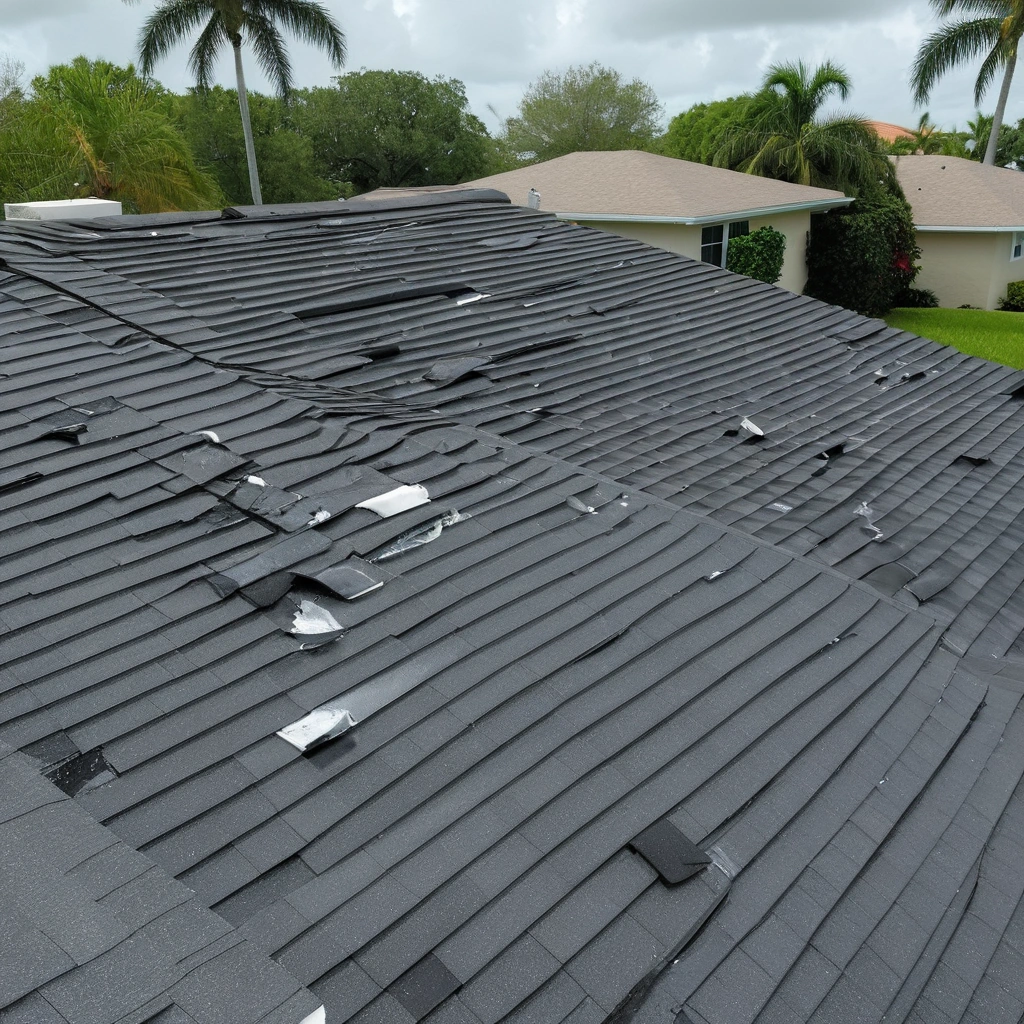Surviving the Storm: A Fort Lauderdale Homeowner’s Guide to Roof Replacement After a Hurricane
The relentless power of hurricanes can leave a devastating mark on homes, and in Fort Lauderdale, Florida, a sturdy roof is often the first line of defense. When a hurricane strikes, roofs can suffer significant damage, often requiring complete roof replacement. This guide provides a comprehensive roadmap for Fort Lauderdale homeowners navigating the complex process of roof replacement after a hurricane, from understanding damage assessment and insurance claims to selecting qualified roofing contractors and adhering to local building codes.
Recent developments in Florida’s property insurance market, including the Florida insurance commissioner’s observations on rate filings and reinsurance costs, make this information even more crucial for homeowners seeking to restore their properties. Understanding the intricacies of homeowners insurance policies, particularly the sections pertaining to hurricane damage and roof repair, is paramount before even contacting a Fort Lauderdale roofing contractor. Fort Lauderdale’s unique geographical location makes it particularly vulnerable to hurricane-force winds and torrential rainfall, necessitating roofing systems built to withstand extreme conditions.
This guide delves into the specific challenges faced by homeowners in this region, offering practical advice on assessing hurricane damage, documenting losses for insurance claims, and choosing roofing materials that meet stringent Florida building codes. For instance, understanding the uplift resistance requirements outlined in the Florida Building Code is crucial when selecting roofing materials. Moreover, navigating the complexities of roof financing options, including potential government assistance programs and loans, is essential for many homeowners facing unexpected roof replacement costs.
Beyond the immediate aftermath, this guide also addresses the long-term implications of a damaged roof, such as potential mold growth and structural compromise. It emphasizes the importance of prompt action and informed decision-making to protect your home and family. We will explore the nuances of dealing with insurance adjusters, ensuring you receive fair compensation for your losses, and provide insights into selecting reputable roofing contractors in Fort Lauderdale with proven track records in hurricane-related roof repairs and replacements. Ultimately, this guide aims to empower Fort Lauderdale homeowners with the knowledge and resources necessary to navigate the roof replacement process with confidence and resilience.
Assessing Hurricane Roof Damage: Documentation is Key
The first crucial step after a hurricane in Fort Lauderdale is a meticulous assessment of the hurricane damage sustained by your roof. Missing shingles are a telltale sign of wind’s destructive force, but a comprehensive evaluation goes far beyond the obvious. Even seemingly minor leaks can insidiously compromise your home’s structural integrity, creating an environment ripe for mold growth and escalating into costly repairs. Structural issues, such as sagging rooflines or displaced roof decking, demand immediate attention from qualified Florida roofing professionals.
Addressing these problems promptly is essential to prevent further deterioration and ensure the safety of your home. Documentation is paramount when filing insurance claims related to roof replacement. Meticulously capture the extent of the hurricane damage with high-resolution photos and videos, paying close attention to areas of concern like damaged flashing, compromised vents, and any visible water intrusion. A detailed record serves as compelling evidence, bolstering your claim and enabling the insurance adjuster to accurately assess the necessary roof repair or full roof replacement.
Remember to document the date and time of the damage assessment, as well as weather conditions, to provide context for your insurance company. This proactive approach can significantly streamline the claims process. In the wake of a hurricane, Fort Lauderdale homeowners must also be cognizant of the complexities within the Florida homeowners insurance landscape. Recent reports highlight the challenges posed by escalating insured losses, such as those stemming from Hurricane Ian, which can impact insurance affordability and availability. Understanding your policy’s coverage for hurricane damage, including deductibles and exclusions, is crucial. Furthermore, be prepared for potential delays in the claims process due to the high volume of claims following a major storm. Engaging with experienced roofing contractors familiar with insurance claims can prove invaluable in navigating these complexities and advocating for a fair settlement.
Navigating the Insurance Claims Process: A Step-by-Step Guide
Filing an insurance claim after hurricane damage can feel like navigating a bureaucratic maze, but understanding the process is crucial for securing the funds needed for roof replacement. Begin by immediately contacting your homeowners insurance company. Provide them with your policy number, contact information, and a detailed, albeit preliminary, description of the hurricane damage. Time is of the essence; many policies have deadlines for filing claims, so prompt action is essential. The insurance company will then assign an adjuster to your case, who will assess the damage and determine the coverage amount.
Remember, thorough documentation, including photos and videos of the damage, is invaluable during this stage. Cooperate fully with the insurance adjuster, providing them with all the documentation you’ve gathered, including any pre-hurricane photos or videos of your roof. Understand your policy coverage inside and out. Florida policies often have specific provisions for hurricane damage, including separate deductibles for named storms and coverage limits for roof repair or roof replacement. Be acutely aware of any exclusions or limitations that may apply to your specific situation.
For instance, some policies may exclude coverage for damage resulting from pre-existing conditions or faulty workmanship. According to the Florida Office of Insurance Regulation, understanding your policy is the single most important step in the claims process. Negotiate with the adjuster if you disagree with their assessment of the hurricane damage. You have the right to obtain a second opinion from a public adjuster or qualified roofing contractors specializing in Florida roofing. A public adjuster works on your behalf, advocating for a fair settlement.
Roofing contractors can provide detailed estimates for roof repair or complete roof replacement, which can be used to support your claim. If negotiations stall, consider mediation or appraisal, which are alternative dispute resolution methods outlined in most insurance policies. Furthermore, explore options for roof financing if the insurance settlement doesn’t fully cover the cost of the necessary repairs or replacement. Remember that the Florida property insurance market is constantly evolving, and recent legislative efforts aimed at stabilizing the market may influence claim outcomes and policy terms. Staying informed about these changes can empower you to navigate the insurance claims process more effectively in Fort Lauderdale.
Contractor Selection: Finding a Reputable Roofing Professional in Fort Lauderdale
Selecting a qualified roofing contractor is paramount to ensuring a successful and durable roof replacement. Seek recommendations from neighbors, friends, or family. Research local professionals through online directories like the Better Business Bureau or Angie’s List. Verify that the contractor is licensed and insured in Florida. This protects you from liability in case of accidents or substandard work. Check online reviews and ratings to gauge the contractor’s reputation. Obtain multiple quotes from different contractors. Compare not only the price but also the scope of work, materials used, and warranty offered.
Evaluate their communication and responsiveness, as this indicates their professionalism and commitment to customer service. As Florida’s insurance landscape shifts, choosing a contractor familiar with insurance claim processes can streamline your project. In Fort Lauderdale, Florida roofing contractors experienced in hurricane damage repair are invaluable. Prioritize those holding certifications from leading roofing material manufacturers, demonstrating advanced knowledge and installation expertise. A contractor familiar with local building codes related to hurricane resistance can ensure your roof replacement meets stringent requirements, potentially mitigating future hurricane damage.
Furthermore, inquire about their experience handling homeowners insurance claims; a seasoned contractor can often assist in navigating the complexities of the claims process, ensuring you receive fair compensation for your roof replacement. Beyond technical qualifications, consider the contractor’s financial stability. A reputable company should readily provide proof of insurance and bonding, safeguarding you against potential liabilities. Request references from past clients, specifically those who have undergone roof replacement due to hurricane damage. A thorough review of their portfolio and testimonials will offer insights into their workmanship and customer satisfaction.
Remember, a slightly higher bid from a well-established and reputable contractor might be a worthwhile investment compared to a significantly lower bid from an unproven entity. Finally, don’t underestimate the importance of a detailed contract. This document should clearly outline the scope of work, materials to be used (including manufacturer and model), project timeline, payment schedule, and warranty terms. Ensure the contract includes provisions for unforeseen issues, such as discovering additional damage during the roof replacement process. A comprehensive contract serves as a vital safeguard, protecting your interests and ensuring a smooth and successful roof replacement experience in Fort Lauderdale.
Roofing Materials & Building Codes: Ensuring Hurricane Resistance
Florida building codes are stringent when it comes to hurricane-resistant roofing, particularly in high-risk areas like Fort Lauderdale. Understanding these codes is crucial for ensuring your new roof meets the required standards and provides optimal protection against future hurricane damage. These codes dictate specific requirements for roof attachment, wind resistance, and material quality, all designed to minimize the impact of extreme weather events. For instance, Florida Building Code Section 1521 addresses specific requirements for high-velocity hurricane zones, outlining the necessary uplift resistance for roofing systems.
Failure to comply with these codes can not only result in fines and mandatory corrections but also jeopardize your homeowners insurance coverage in the event of future hurricane damage. Therefore, familiarizing yourself with these regulations is a vital first step in the roof replacement process. Choose roofing materials that are specifically engineered to withstand high winds and heavy rain, a critical consideration for any roof replacement project in Fort Lauderdale. Options abound, ranging from traditional asphalt shingles to more robust tile and metal roofing systems, each offering varying degrees of wind resistance and durability.
Asphalt shingles, while cost-effective, should be impact-resistant and rated for high wind speeds, ideally with a UL 2218 Class 4 rating for impact resistance and an ASTM D7158 Class H rating for wind resistance. Tile roofing, known for its longevity and aesthetic appeal, offers excellent wind resistance when properly installed. Metal roofing, particularly standing seam metal roofs, provides the highest level of protection against hurricane-force winds, often exceeding 150 mph. When making your selection, consider not only the material’s wind resistance but also its lifespan, maintenance requirements, and aesthetic compatibility with your home.
Proper installation techniques are just as critical as the choice of materials when it comes to hurricane-resistant roofing. This includes meticulous attention to detail, such as using the correct number of nails or screws per shingle, properly sealing flashing around vents and chimneys to prevent water intrusion, and ensuring adequate roof deck attachment to the underlying structure. For example, using ring-shank nails instead of smooth-shank nails significantly increases the uplift resistance of shingles. Similarly, properly installed flashing around roof penetrations is essential to prevent water from seeping under the roofing material and causing damage to the roof deck and interior of the home.
Compliance with local building codes is not just a legal requirement; it’s also essential for protecting your home and family and safeguarding your investment. Consider consulting with a qualified building inspector or Florida roofing contractors specializing in hurricane-resistant construction to ensure your roof meets all applicable codes and best practices. Furthermore, understanding the nuances of homeowners insurance policies related to roof replacement after hurricane damage is crucial. Many policies have specific clauses regarding wind damage, deductible amounts, and the depreciation of roofing materials.
Documenting the damage thoroughly and working closely with your insurance adjuster is essential to ensure a fair settlement. If your insurance claim is denied or underpaid, consider consulting with a public adjuster or attorney specializing in insurance claims to advocate for your rights. Additionally, explore roof financing options if your insurance coverage doesn’t fully cover the cost of roof replacement. Several programs offer loans and grants for homeowners in hurricane-prone areas to help them fortify their homes against future storms. Prioritizing a hurricane-resistant roof is not just a home improvement project; it’s an investment in the long-term safety and security of your property.
Temporary Repairs & Cost Considerations: Protecting Your Home and Finances
Before a full roof replacement can be completed, temporary roof repair may be necessary to prevent further hurricane damage and water intrusion. Tarping remains a common and often crucial method for Fort Lauderdale homeowners, but it’s essential to execute it correctly. Use heavy-duty, waterproof tarps – often blue polyethylene tarps are a readily available option – and secure them meticulously. Instead of solely relying on nails, consider using furring strips along the edges of the tarp, screwing them into the roof decking to create a more robust seal against wind uplift.
Ensure the tarp extends at least four feet beyond the damaged area on all sides to provide adequate coverage and channel water away from vulnerable spots. For interior leaks, strategically place multiple buckets or containers, and line floors with plastic sheeting to minimize secondary damage. Remember to document all temporary repairs with photos and videos for your homeowners insurance claim. If you’re uncomfortable performing temporary repairs yourself, promptly contact a licensed Florida roofing contractor for assistance; delaying action can exacerbate the damage and potentially complicate your insurance claims process.
Estimating the cost of a roof replacement in Fort Lauderdale involves a careful assessment of several interconnected factors. The roof’s square footage is a primary driver, as is the choice of roofing materials. Asphalt shingles are generally the most affordable option, while tile and metal roofing offer enhanced durability and wind resistance, but come at a higher upfront cost. Labor costs also fluctuate depending on the complexity of the roof design and the roofing contractors’ rates.
Obtain multiple quotes from reputable roofing professionals, ensuring each quote provides a detailed breakdown of material costs, labor charges, permit fees, and any potential additional expenses. Remember that opting for hurricane-resistant roofing materials, even if they carry a higher initial price tag, can lead to long-term savings through reduced insurance premiums and enhanced protection against future storm damage, aligning with Florida building codes. Explore various roof financing options to manage the financial burden of a roof replacement.
Home equity loans or lines of credit can provide access to substantial funds at relatively low interest rates, using your home’s equity as collateral. Personal loans offer another avenue, although interest rates may be higher. Many roofing material manufacturers also provide financing programs with competitive terms. Furthermore, investigate potential tax benefits for energy-efficient roofing upgrades; certain improvements may qualify for federal or state tax credits, reducing your overall expenses. Understanding the intricacies of homeowners insurance coverage is also paramount. Review your policy carefully to determine the extent of coverage for roof replacement due to hurricane damage. Be prepared to negotiate with your insurance company and, if necessary, consult with a public adjuster to advocate for your interests and ensure you receive a fair settlement to cover the cost of your roof replacement.



